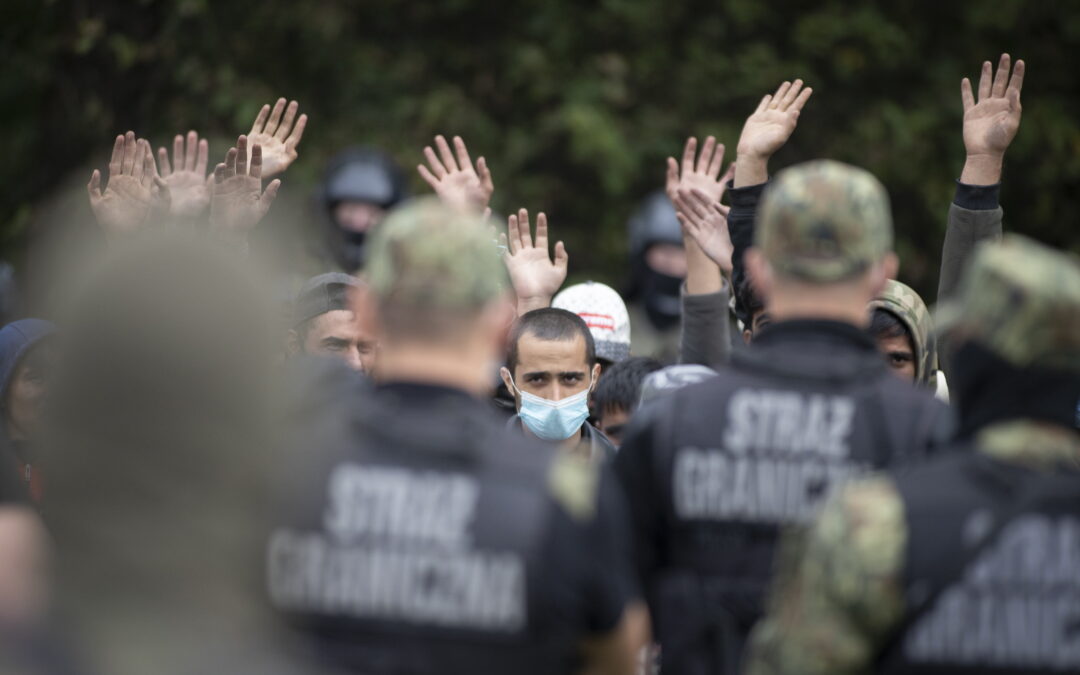Poles are evenly divided over whether they support or oppose the government’s tough response to a recent surge in illegal crossings – mainly of Iraqis and Afghans – at the border with Belarus. The issue has become a domestic political flashpoint as well as a humanitarian and geopolitical crisis.
The same poll also shows that only a small minority of the Polish public favour accepting everyone seeking asylum at the border. However, a majority express willingness to take in at least some of them under certain conditions.
In response to the unprecedented number of illegal crossings this year, the government has sent 2,000 soldiers to the border and ordered the construction of a barbed-wire fence. It is also seeking to introduce a state of emergency, although that development came after the poll was taken.
Warsaw insists that those trying to cross are “economic migrants” on Belarusian territory and therefore the responsibility of Minsk. Polish security services have sought to prevent them from crossing, including a group of around 30 Afghans who have been camped on the border for around three weeks.
Asked if they support the policies of the Polish state regarding the situation on the border, 45.5% of respondents said that they do and 42.4% that they do not, in a United Surveys poll for Dziennik Gazeta Prawna and RMF FM.
The survey found a sharp gender division: 60% of men expressed support for the government’s line and 31% were opposed; among women, the figures were 33% and 52% respectively.
Whereas 70% of supporters of the United Right (ZP), Poland’s national-conservative ruling coalition, supported the government’s border policies, among voters of the centrist Civic Coalition (KO) and The Left (Lewica) – the two largest opposition groups – 75% and 72% respectively opposed them.
United Surveys also asked what the Polish government should do regarding people illegally crossing the border from Belarus into Poland, which is also the European Union’s eastern frontier.
A quarter of people (25.3%) said that it should not accept any of them, while 9% believe that it should take in everyone seeking asylum. A majority, however, held an opinion between those two extremes.
The largest proportion (36.9%) said that Poland should admit “people seeking asylum but only those positively verified by the Polish authorities”. A further 14% said that Poland should accept “people seeking asylum and discuss the possible relocation of foreigners with other EU countries”. Finally, 9.1% favoured Poland letting in “only foreigners with professional qualifications”.
On this issue, supporters of Poland’s two main political forces were more closely aligned. Among both ZP and KO voters, the largest proportion (45% and 58% respectively, favoured accepting on Polish territory people seeking asylum but only those positively verified by the Polish authorities.
Supporters of The Left were most likely to favour accepting people seeking asylum and discussing the possible relocation of foreigners with other EU countries (30%).
Another poll published this week, by IBRIS for Rzeczpospolita, produced similar results. A quarter (26%) want Poland to reject the reception of refugees; half (50%) say Poland should take in “a few thousand” refugees from Afghanistan whose lives are in danger; and 12% think Poland should relax its rules on admitting refugees.
The Polish government has faced criticism from some human rights groups and opposition politicians, who say that the authorities have been illegitimately refusing to admit people who declare a design to claim asylum.
A separate opinion poll published last week found that most Poles were opposed to admitting migrants and refugees when presented with a simple yes/no choice. It also showed that almost half favoured building a wall on the border.
Separately, Poland has also admitted over 1,000 Afghans that it evacuated from Kabul after the Taliban’s takeover. Their asylum requests are currently being processed.
Main image credit: Grzegorz Dabrowski / Agencja Gazeta

Daniel Tilles is editor-in-chief of Notes from Poland. He has written on Polish affairs for a wide range of publications, including Foreign Policy, POLITICO Europe, EUobserver and Dziennik Gazeta Prawna.




















